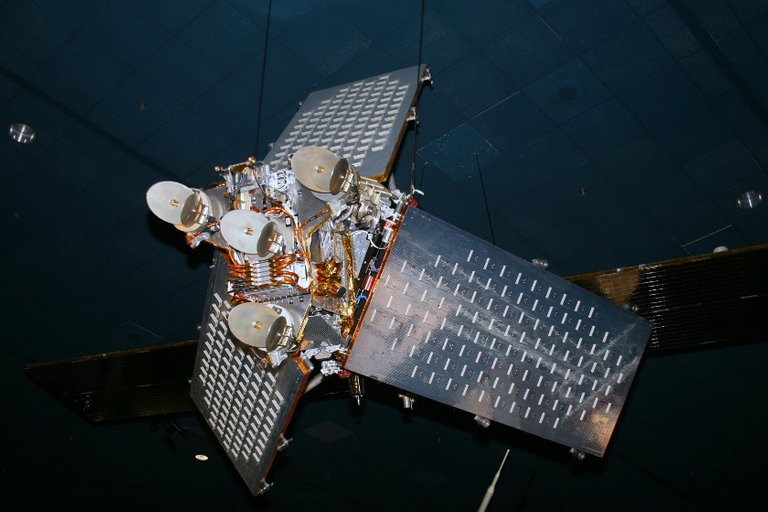Some of you have read William Gibson's cyberpunk novels and love their romantic view of technology. As more and more network accessible technology gets accumulated, his sci-fi world is slowly becoming a reality.
Imagine this: a planet full of old technology, laying around everywhere - from old network cameras at people's homes to abandoned military communications software, flying on a decaying orbit around Earth. And we are now in the future, holding on to cheap, powerful hardware, which can interface with any of these devices.
Image property of its respective owner. Hack the planet, Cereal Killer!
Following Sputnik's launch in 1957, there have been over 6600 (official) satellites launched in space. Currently there are 3600 still orbiting our planet, with approximately a thousand still operational. [1]
So, a thousands toys to play with, right? Not necessarily.
Most satellites, having completed their original mission, undergo a standard shutdown protocol. Mission Control instructs the satellite to position itself on a decaying orbit, empty its batteries and shut down permanently, thus preventing any misuse of the satellite and also providing more available space for future deployment. Then everyone moves on to their next project, assured that their now defunct satellite will eventually burn up on reentry. Indeed, there is at least one satellite reentering our atmosphere weekly.
Image property of its respective owner.
The availability of cheap radio hardware combined with people's intrinsic desire to exploit hardware, proved that this is not often the case. The forceful depletion of batteries, during the shutdown process of some satellites, would cause them to fuse together, in effect leaving the power circuit closed. While in the shadow of the planet, these satellites would remain nonoperational, but as soon as their solar arrays get a glimpse of the Sun, they would boot up and start transmitting data.
This means that a number of the officially defunct satellites are, in fact, still accessible. "Accessible" being the proper way to describe their simple, non-encrypted protocols, which were state of the art, several decades ago.
Weather satellites. There are a number of them, which can be easily accessed. More commonly, people prefer the NOAA weather satellites, because of their high resolution, but there are even Soviet era satellites, which you can tap into (for that Gibson feeling, right?!).
Image property of its respective owner. Image obtained from a NOAA satellite, using RTL-SDR.
You can find all that's required on the RTL-SDR website, but to summarize:
- An RTL-SDR dongle - basically the minimum hardware required for communication - the rest of the expensive hardware functionality has now been taken over by software. There is even better, more sensitive hardware out there, but at $20, you can't beat the price of this dongle. It's also very much useful for sniffing (and replaying!) communication of ubiquitous home appliances - wireless phones, car remotes, garage doors, etc. Yes, you can open your neighbor's garage door, if it's not the latest generation, featuring encryption, and drive him insane!
- Talking about software - SDRSharp.
- An antenna, for better reception.
Communication satellites. The Iridium network. A network of 66 satellites, spread out in 6 groups of 11 satellites, in effect covering the entire planet's surface. That's right, the huge phones with sticking antennas you see in movies, are connecting to the Iridium network.
Image property of its respective owner. A replica of an Iridium satellite.
Developed in 1987 and launched in 1998, it's no surprise that the technology used was already antiquated. In fact, most of the communication is sent in clear text. What is even more surprising is that the biggest client of the network, according to a WikiLeaks article, is the Pentagon. [2]
Relay satellites. Here we enter the danger zone. Globalstar satellites are simple relays - what you send on one end, arrives on the other. No actual need to hack the satellite, but tapping into the uplink means that you can alter the data being sent. This is exactly what a BlackHat participant succeeded in doing, by reverse engineering the protocol from the hardware given to customers to track their items. [3]
He hypothesized that this method can be used to alter the location of valuable items - vehicles, armored trucks and even planes, which the attacker may force to appear on a different location (or disappear) from their intended course. Patching this security hole may turn out to be impossible, as it probably requires physical access to the satellites.
Talking about disappearing planes reminds me of yet another functionality of the RTL-SDR. You can wreak havoc at your local airport control tower, by emulating non-existing aircraft on their radar. But I know you wouldn't.
Because that's not the Gibson way.
Image property of its respective owner. Crash and Burn, baby!
This is the first of a series of articles. Be sure to follow #dek-science for more!
Check out my latest articles:
- DEK Photography: Last Week's Photos in a Single Post!
- Poll: Steemit User Loyalty
- DEK Photography: Candle Light
I offer Professional Translation and Editing Services in exchange for Steem.
The era of commercial space will bring access to space to any kind of IoT device for affordable costs; there is a OECD scenario called "Democratizing Space" that actually introduce the use of low-cost device like Cubesat (see https://en.wikipedia.org/wiki/CubeSat) for the sake of public or private research and operations.
Interesting read, sound a little bit dangerous if someone has malicious intent.
Glad someone read through it, thank you! :)
It is, indeed, dangerous, especially in the hands of the wrong people. I find it rather amusing that plane positioning technology is so vulnerable to a $20 piece of hardware and that there's no clear indication of an immediate response to this threat. It's also rather interesting whether airplane ticket sales would go down, if a major news network informs the wide audience of this problem.
Interesting story in light of the recent developments seeing a whole swarm of dumb network devices hacked to produce some of the most intensive DDoS attacks ever performed so far... These insecure systems are surely going to cause a serious incident soon... and the pentagon, major user of a satellite that communicates in cleartext? that is gold! Presumably the texts are still encoded in some way, but wide open for monitoring... And people buy this nonsense that the russians are 'hacking' the USA. lol! If there is no circumvention, is it really hacking?
Hey, l0k1 :) I do hope they use some sort of encryption, despite the channel being in clear text. Although I wouldn't be surprised that the Pentagon was convinced into using an antiquated technology through the use of a cunning Power Point presentation.
Come to think of it, it's not Windows, it's not Linux, it's not the software behind Samsung's automatic machine guns, which protect its border with Northern Korea (I have to write up on that too!), but it's Power Point - probably the single most powerful software on the planet, which has brought trillions to its users.
Anyone who coughs up cash after a powerpoint presentation probably is a sucker, in my view. Sure, I would like people to throw money at me, but I'm not just hustling people, I want real world results at the end of the day.
That's why you don't work for the Pentagon. You know too much :D
Not to mention that I would probably specifically want to sell them something that would actually make their work less effective if I was to try (though I doubt it, I'm pretty sure my name appears somewhere a little ways down on many of their lists). I'm not paranoid, I in fact revel in this, because I know that I generally am sharing ideas that are far above their puny little yes-man brains to even grasp the threat they present, if realised.
I think they realize the threat they pose and are both cautious and proud of it. It's human nature to be corrupted by power, so unless you manage to disarm everyone on the planet, at the same time, disarming the single most powerful army would probably lead to global war.
Disarmament is not in my list of goals, in fact I think everyone should be armed and capable of combat. But the best remedy and preventative for war is trade.